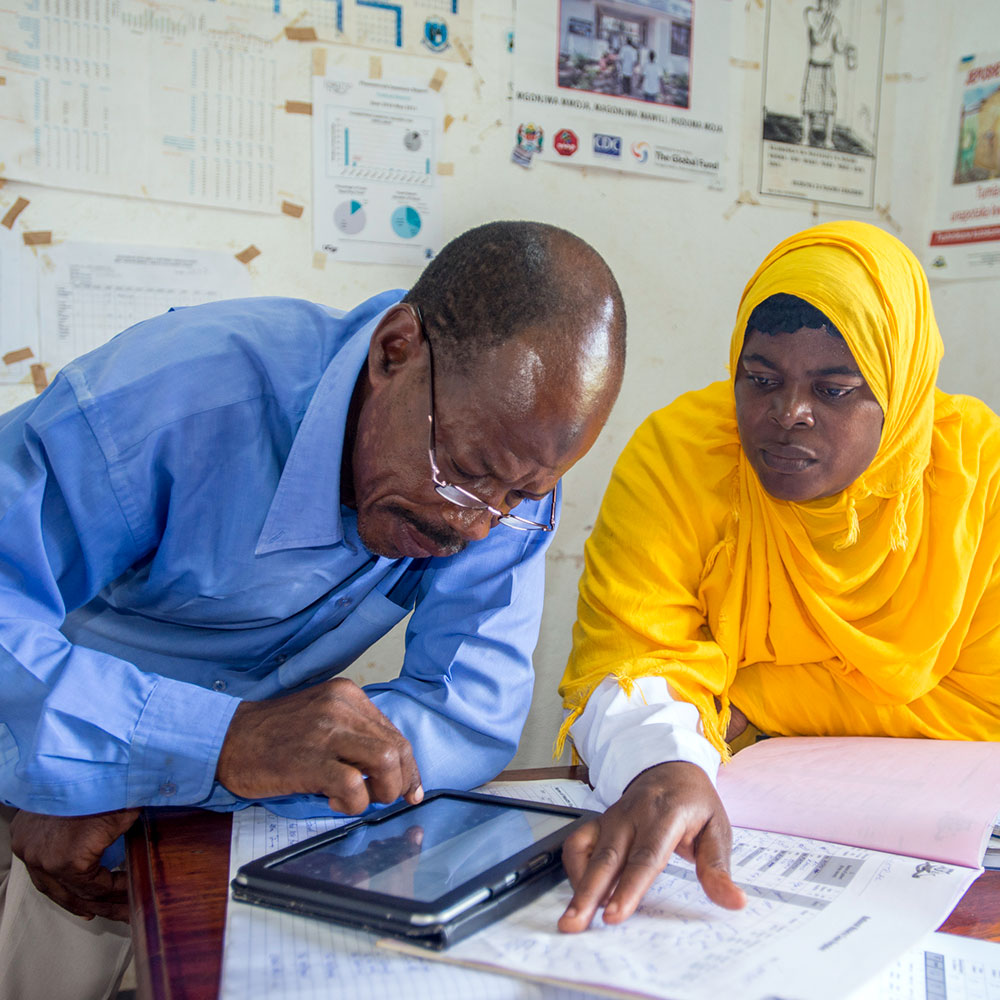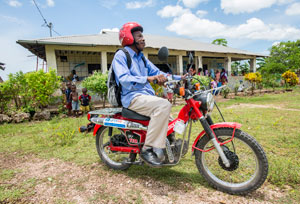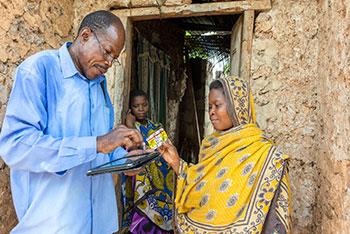
District Malaria Surveillance Officer Shabani Khamis uses the Coconut Surveillance system to respond to a malaria case reported by the Charawe Health Facility. Credit: RTI International
Efforts to control malaria in Zanzibar have yielded dramatic results, with malaria prevalence reaching 0.2 percent. Zanzibar’s success stems from a combination of highly effective malaria prevention and control interventions, including increased coverage of indoor residual spraying and insecticide-treated mosquito nets, as well as the use of robust surveillance and epidemic detection systems.
Funded by the President’s Malaria Initiative (PMI), the Tanzania Vector Control Scale-up Project (TVCSP), in partnership with the Zanzibar Malaria Elimination Program (ZAMEP), developed and piloted the Malaria Epidemic Early Detection System (MEEDS) in 10 health facilities, in 2008. This groundbreaking mHealth system is used by health facilities to report new malaria cases through mobile phones, which ensures that epidemic outbreaks are identified within two weeks of their onset.
By 2010, a total of 90 health facilities, including three public and three private hospitals, were utilizing MEEDs. Today, ZAMEP, with support from TVCSP, operates a full malaria case notification system in 157 facilities throughout Zanzibar. MEEDS effectively detects the early stages of an epidemic by measuring real-time changes in frequency and incidence rates of malaria cases.

District Malaria Surveillance Officer Shabani Khamis travels from the Charawe Health Facility to the household to follow up with the patient and their family. Credit: RTI International
In the continued fight against malaria, ZAMEP and TVCSP scaled up malaria surveillance in 2012 by launching the Coconut Surveillance system. This innovative system works through MEEDS by alerting district malaria surveillance officers to new malaria case reports via a mobile application. ZAMEP district malaria surveillance officers are then guided through an active case detection protocol by the Coconut Surveillance program.
District malaria surveillance officers access Coconut through mobile phones and tablets equipped with wireless Internet connections. As part of the active case detection protocol, district malaria surveillance officers respond to each new case, using motorbikes to travel to the affected communities. There, they test other household members for malaria, assess environmental factors, and report data through the Coconut system to facilitate a rapid response to any other new outbreaks.
“Now with the Coconut system, we are receiving instant notifications and are able to send district malaria surveillance officers into the community to follow up within 48 hours,” says Dr. Issa Garimo, TVCSP team leader in Zanzibar.
Using the Coconut system, district malaria surveillance officers can follow up on each case and collect data at the health facility and household level. The data are then stored in a cloud-based server and can be tracked in real-time by ZAMEP and TVCSP surveillance staff. ZAMEP and TVCSP aim to respond to 90 percent of new cases within the first 48 hours from the initial notification.

District Malaria Surveillance Officer Shabani Khamis visits the home of a newly reported malaria case in Charawe village. Credit: RTI International
“The Coconut system is very simple and straightforward,” says Maryam Abdi, a laboratory technician who uses MEEDS to report new malaria cases at Chukwani Health Facility. Ms. Abdi says, “It’s very useful because if a new case comes in to the health facility, the district surveillance officer can follow up in the community, where they can find secondary patients and treat them on site.”
In addition to the strong malaria surveillance and detection systems developed, the collaboration between TVCSP and the Government of Zanzibar has been a fruitful partnership, in which the two entities work hand-in-hand to reduce malaria cases and save lives in Zanzibar. According to Ms. Abdi, “The relationship with the Zanzibar Ministry of Health [and TVCSP] is very good. We appreciate the punctuality of the DMSOs in responding to the cases.”
To learn more about the Tanzania Vector Control Project’s malaria case notification systems, visit: www.ictedge.org/meeds and www.ictedge.org/coconut-surveillance.
